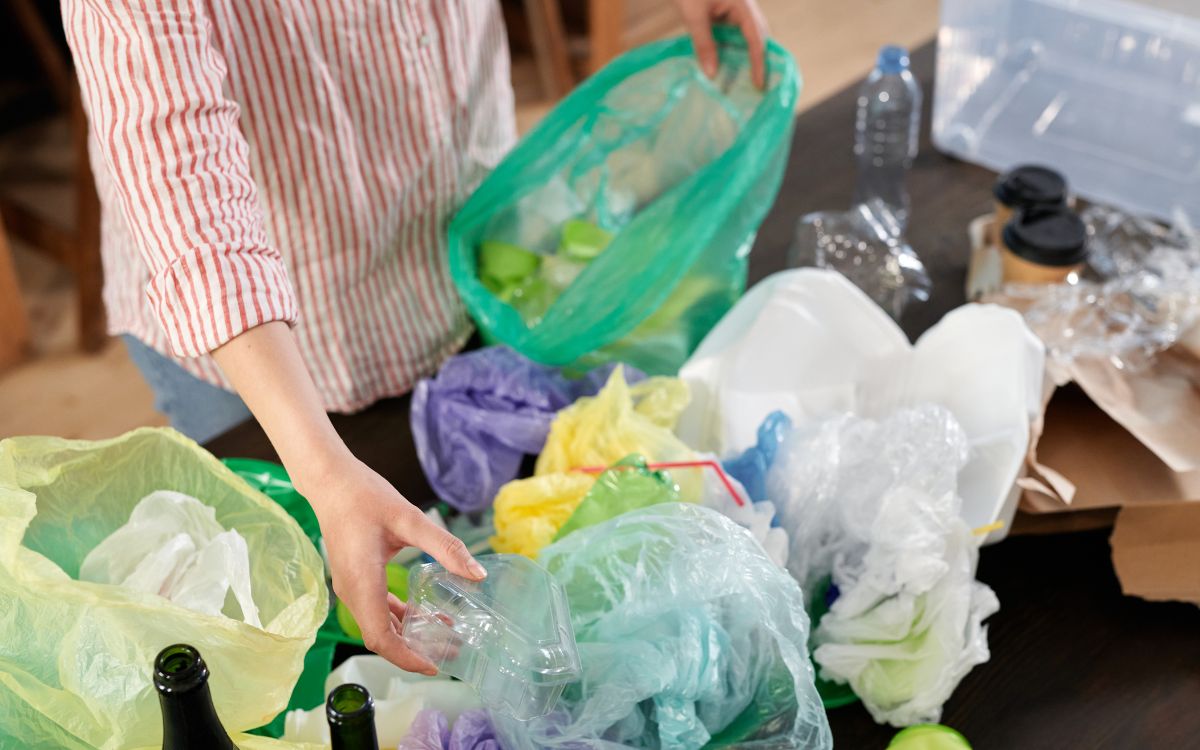Plastic waste has become a global environmental crisis, and the kitchen is one area where it tends to accumulate at an alarming rate. From single-use plastic bags and food containers to disposable cutlery and packaging, our daily kitchen activities contribute significantly to this problem. However, there are simple yet effective steps we can take to reduce plastic waste and make our kitchens more eco-friendly.

In this blog post, we will explore various tips and alternatives that can help us minimize plastic waste in the kitchen. By adopting these practices, we can play our part in preserving the planet and creating a healthier future for ourselves and generations to come.
Understanding the Problem
Plastic waste has become a pressing environmental issue that threatens ecosystems and wildlife across the globe. The dangers of plastic waste are far-reaching and demand our attention and action. From the moment plastic is produced to its eventual disposal, it poses a significant risk to the environment.
The Dangers of Plastic Waste
Plastic waste has devastating consequences for our natural surroundings. When plastic enters ecosystems such as oceans, rivers, and forests, it can persist for hundreds of years, slowly breaking down into smaller microplastics that are ingested by marine life.
This leads to severe harm to marine ecosystems, including entanglement, ingestion, and disruption of the food chain. Additionally, the accumulation of plastic waste in landfills contributes to the release of harmful greenhouse gases, exacerbating climate change.
Plastic Waste in the Kitchen
The kitchen is a hotspot for plastic waste generation due to the prevalent use of single-use plastic items and excessive packaging. From disposable food containers and plastic cutlery to plastic bags and cling wraps, our everyday kitchen activities contribute to the problem.
This includes both the items we bring into the kitchen and the waste we generate during food preparation and consumption. Understanding the role of the kitchen in plastic waste generation is crucial in finding effective solutions to mitigate its impact. By examining our habits and exploring alternatives, we can make a positive change and reduce plastic waste in the kitchen.
Tips for Minimizing Plastic Waste
Minimizing plastic waste in the kitchen requires a conscious effort to adopt sustainable practices and make eco-friendly choices. By implementing the following tips, you can significantly reduce your reliance on plastic and make a positive impact on the environment.
Embracing Reusable Options
One effective way to minimize plastic waste in the kitchen is to embrace reusable options. Replace single-use plastic items with durable, reusable alternatives. Invest in reusable shopping bags made from fabric or sturdy materials that can be easily washed and carried for multiple uses.
Swap out disposable food storage containers and wraps for glass or stainless steel containers that can be used repeatedly. By making these small changes, you can significantly reduce the amount of plastic waste generated in your kitchen.
Reducing Single-Use Plastic
Another important step in minimizing plastic waste is to actively reduce the use of single-use plastics. Opt for refillable water bottles and thermoses instead of buying bottled water or drinks in plastic containers. Choose glass or stainless steel straws, or even consider going without straws altogether.
When dining out, politely decline single-use cutlery and bring your own reusable utensils. By being mindful of single-use plastic items and seeking alternatives, you can make a significant difference in reducing plastic waste.
Buying in Bulk
Buying in bulk is not only cost-effective but also helps in reducing packaging waste. Look for stores that offer bulk bins where you can purchase grains, legumes, spices, and other food items without packaging. Bring your own reusable bags or containers to fill with these items, minimizing the need for plastic packaging.
Buying in bulk not only reduces plastic waste but also allows you to purchase just the amount you need, reducing food waste as well. Explore this option and see how it can positively impact both your wallet and the environment.
Sustainable Kitchen Practices
Adopting sustainable kitchen practices goes beyond reducing plastic waste. It involves implementing eco-friendly habits and making conscious choices that promote a greener and more sustainable lifestyle. By incorporating the following practices into your daily routine, you can create a kitchen environment that aligns with your commitment to environmental stewardship.
Composting and Food Waste Reduction
Implementing a composting system in your kitchen is an effective way to reduce food waste and minimize your environmental impact. Separate organic kitchen waste, such as fruit and vegetable scraps, coffee grounds, and eggshells, and divert them to a compost bin or pile.
Composting not only reduces the amount of waste sent to landfills but also produces nutrient-rich compost that can be used to nourish your garden or potted plants. Additionally, practicing mindful meal planning, proper storage, and utilizing leftovers can help minimize food waste and contribute to a more sustainable kitchen.
Growing Your Own Food
Creating a small kitchen garden or utilizing indoor pots to grow herbs and vegetables is a sustainable practice that connects you with nature and reduces your reliance on store-bought produce. Growing your own food allows you to have fresh, pesticide-free ingredients at your fingertips while minimizing the carbon footprint associated with transporting and packaging store-bought produce.
Even if you have limited space, you can still grow herbs like basil, mint, or parsley on your windowsill or balcony. Embrace the joy of gardening and experience the satisfaction of harvesting your own homegrown produce.
Mindful Grocery Shopping
Making mindful choices when grocery shopping can have a significant impact on reducing plastic waste and promoting sustainability. Prioritize locally sourced and package-free products whenever possible. Support farmers’ markets or local produce stands where you can find fresh, unpackaged fruits and vegetables.
Bring your own reusable produce bags or containers to avoid using plastic bags provided at the store. Additionally, consider purchasing products with minimal or recyclable packaging, and opt for brands that prioritize sustainability and eco-friendly practices. By being conscious of your shopping choices, you can contribute to a more sustainable food system.
Exploring Plastic Alternatives
In the quest to reduce plastic waste in the kitchen, it’s essential to explore alternative materials that can replace traditional plastic items. By choosing eco-friendly alternatives, you can contribute to a more sustainable lifestyle while minimizing your environmental footprint. Consider the following plastic alternatives to make your kitchen a plastic-free zone.
Eco-Friendly Food Storage
One area where plastic is commonly used in the kitchen is food storage. Fortunately, there are various alternative materials that can effectively replace plastic containers and wraps. Glass containers are an excellent option as they are durable, non-toxic, and can be easily reheated in the oven or microwave.
Stainless steel containers are another alternative, known for their durability and ability to keep food fresh. Additionally, silicone food storage bags and wraps provide a reusable and washable solution for keeping food sealed and protected. Explore these eco-friendly alternatives and find the ones that best suit your needs and preferences.
Sustainable Kitchen Tools
Beyond food storage, there are many sustainable alternatives to plastic kitchen tools and utensils. Bamboo utensils, for example, are a popular choice as they are lightweight, biodegradable, and renewable. They offer a natural and eco-friendly option for cooking and serving meals.
When it comes to cleaning, consider using eco-friendly brushes and scrubbers made from materials like coconut fiber or wood. These alternatives are durable, effective, and gentle on the environment. By replacing plastic kitchen tools with sustainable alternatives, you can make a positive impact on the planet and create a more eco-conscious kitchen.
Spreading Awareness and Encouraging Change
Creating a significant impact in reducing plastic waste requires not only personal action but also spreading awareness and inspiring others to make a change. By sharing knowledge, engaging in conversations, and supporting local initiatives, we can collectively drive a movement towards a more sustainable future.
Educating Others
One of the most powerful ways to make a difference is by educating others about the impact of plastic waste and the importance of reducing it. Share information through social media platforms, blogs, or community events. Discuss the harmful effects of plastic on the environment, wildlife, and human health.
Highlight success stories and initiatives that promote sustainable living. By raising awareness and providing practical tips, you can inspire others to take action and make sustainable choices in their own lives.
Supporting Local Initiatives
Supporting local initiatives focused on reducing plastic waste is a great way to actively contribute to the cause. Get involved in community clean-up efforts, where you can help remove plastic waste from natural environments. Volunteer or donate to organizations that work towards plastic pollution reduction or offer educational programs.
Moreover, support local businesses that prioritize sustainability by purchasing their products or spreading the word about their initiatives. By supporting local efforts, we can create a collective impact and foster a sense of community towards a plastic-free future.
Conclusion
Reducing plastic waste in the kitchen is not just a noble cause, but a necessity for the well-being of our planet. By embracing reusable options, minimizing single-use plastics, practicing sustainable kitchen habits, exploring plastic alternatives, and spreading awareness, we can make a significant impact on the amount of plastic waste generated in our daily lives. Remember, every small change matters, and together, we can create a greener, cleaner, and more sustainable kitchen environment.









